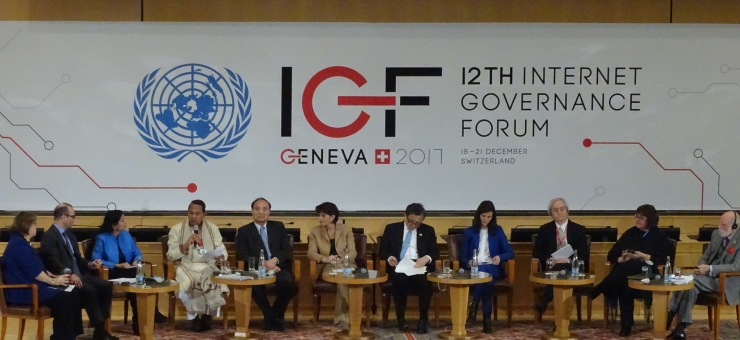News
UNI GS urges IGF to pursue a people centred approach in the new world of work

UNI General Secretary Philip Jennings was invited to address the Internet Governance Forum at the United Nations in Geneva.
The IGF is the public policy home for issues relating to the internet.
Jennings appealed to the IGF to pay close attention to the impact of digital change on the worlds workforce. He argued that in this period of deep transformation, which offered so many opportunities to people, insufficient attention was being devoted to jobs and the social consequences of change.
Our sense is that we are not sufficiently prepared to accompany people to face the digital change that is disrupting business and labour markets. There were conflicting messages - on the one hand, empirical research which spoke of a massive jobs cull and the other that says ‘it will be alright on the night’. The latter claim is based on previous periods of economic transformation, where new jobs were created in sufficient numbers.
Each day there was speculation on the impact that AI could have, with one author claiming it would replace all human labour. This follows comments from Elon Musk that AI posed a threat to our civilisation.
The IGF were urged in their public policy debates to ensure that people were not “left behind”, to promote policies that place people and jobs as the centre to their economic thinking.
What was not disputed was that the digital revolution would create more wealth and add to GDP - what was disputed was the distribution of that wealth. The key challenge is to ensure that social justice is also delivered in the 21st century.
The IGF should not consider labour as a commodity, they should look at work in the broader sense. Good work can bring dignity, security and respect, and should be available to all. Work should sustain the well being of people and communities.
The market alone could and would not deal with the social consequences of changes in occupation, quantity and quality of jobs, job segmentation and gender inequality.
Jennings drew attention to the platform economy, which was treating labour as a commodity. The IGF should also take a stand to ensure platform workers labour rights were protected and end the wilful misclassification of platform workers where they fall through a 'trapdoor' with no access to leagl and welfare protection.
The public policy toolbox was not empty. There was a “chronic underinvestment in human capital” and a combination of avoiding unacceptable forms of work, promoting quality work, active labour market policies, ensuring equality of access to basic education, social safety nets, having access to life long learning, building labour rights and structures all had a role to play in order to accompany people in this time of change.
This was not the time to trust “the invisible hand” of the market - the “Big 3”, Amazon, Google and Facebook were highly visible in their domination of data ownership, mining and control. The IGF should be worried about this.
Adam Smith, if he were alive today would be warning about the issues arising from the monopoly powers of the “Big 3”.
Unions worldwide were taking up the challenge of the future of work. They were organising workers, promoting workplace rights, tackling data protection and pushing for regulation over the application of AI in the workplace.
UNI Global Union had just published two sets of guidelines on the two key areas of data and A.I, and we saw our responsibility to shape change for the ‘common good’. This debate was essentially about peace and social cohesion - how could there be lasting peace if there was no social justice?
The IGF should encourage governments everywhere to establish National Commissions on the future work as the ILO has done globally.
It was important that policies were in place “to accompany people and not to leave them abandoned” as digital change continued to disrupt labour markets.

